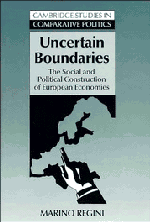Book contents
- Frontmatter
- Contents
- Preface
- Acknowledgements
- Introduction: the shifting boundaries between market, politics and society
- PART I THE RISE AND DECLINE OF THE POLITICAL REGULATION OF THE ECONOMY
- PART II THE MICRO-SOCIAL REGULATION OF ECONOMIC ADJUSTMENT
- 5 The crisis of political exchange and the growth of micro-concertation
- 6 The search for flexibility
- 7 The problem of consensus in production
- 8 An emblematic case: industrial adjustment and micro-concertation in Italy
- Conclusion: the uncertain boundaries between macro and micro – the production of collective goods in the European economies
- Notes
- References
- Index
8 - An emblematic case: industrial adjustment and micro-concertation in Italy
Published online by Cambridge University Press: 26 May 2010
- Frontmatter
- Contents
- Preface
- Acknowledgements
- Introduction: the shifting boundaries between market, politics and society
- PART I THE RISE AND DECLINE OF THE POLITICAL REGULATION OF THE ECONOMY
- PART II THE MICRO-SOCIAL REGULATION OF ECONOMIC ADJUSTMENT
- 5 The crisis of political exchange and the growth of micro-concertation
- 6 The search for flexibility
- 7 The problem of consensus in production
- 8 An emblematic case: industrial adjustment and micro-concertation in Italy
- Conclusion: the uncertain boundaries between macro and micro – the production of collective goods in the European economies
- Notes
- References
- Index
Summary
The changes in the organization of firms that took place during the 1980s in Italy (in line with the more general trends described in Chapter 6) were exceptionally far-reaching and rapid. No one could have predicted their range and impact as the decade began. In the late 1970s, in fact, large firms and unions seemed to be locked in disastrous stalemate. Although the unions were greatly weakened, they still retained sufficient power to block, if they wished, successful adjustment to an economic environment that had become increasingly uncertain. The firms, for their part, had it in their power to decentralize production to small units operating beyond the control of factory councils, to make selective use of the Wages Guarantee Fund in order to disrupt trade-union organization in the work-place and to introduce new technologies a little at a time, thereby gradually eroding the unions' ability to exercise effective control over labour.
In this situation the only winners were apparently small firms, which were able to take considerable advantage of the wave of decentralization. The so-called Third Italy (central and northeastern), with its economy based on industrial districts – that is, integrated systems of highly flexible small firms (Brusco 1986; Bagnasco 1988) – seemed to encapsulate everything new that Italian industry had to offer and consequently attracted much attention from observers, with the concomitant neglect of both the North-West Italy of earlier industrialization and the Mezzogiorno.
During the 1980s, however, the situation changed extremely rapidly (Barca and Magnani 1989).
- Type
- Chapter
- Information
- Uncertain BoundariesThe Social and Political Construction of European Economies, pp. 111 - 126Publisher: Cambridge University PressPrint publication year: 1995



